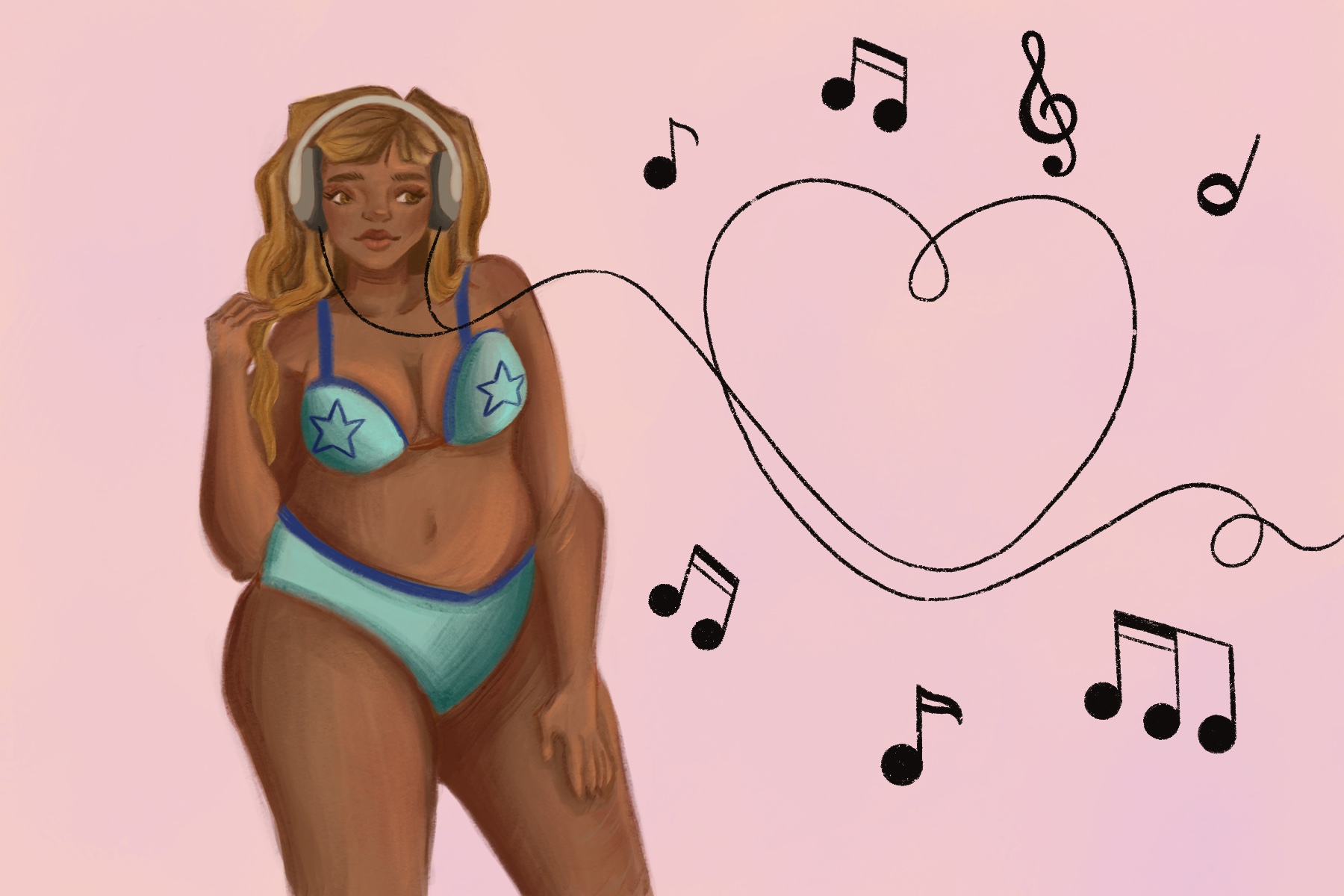Body positivity seems to be one of the biggest buzzwords today. From TV series like “Saturday Night Live” player Aidy Bryant’s “Shrill” to movies like Netflix’s “Dumplin,” women in entertainment are spreading the message that all bodies are beautiful in every shape and size. While the concept of body positivity might seem relatively modern, it has been around in the world of music for many years, especially in the works of female artists.
Despite the term being thrown around quite a bit, there isn’t one cut-and-dry definition of body positivity. Basically, having body positivity is accepting and celebrating your body and others’ despite their size.
One of the first artists to include tones of body positivity in their music is Christina Aguilera. Aguilera arrived on the music scene in 1999 with her eponymous album, “Christina Aguilera.” The album included huge hits like “Genie in a Bottle” and “What a Girl Wants.”
Aguilera later went on to record her second album, “Stripped,” which included the controversial tune, “Dirrty.” Aguilera responded gracefully to the criticism she received regarding the song and accompanying music video by explaining how the song and the persona she developed with the launch of “Stripped” was her way of expressing her power over her body and those around her. Many have found the song to be somewhat of an anthem celebrating women and their sexuality.
However, fans of Aguilera might argue that the songstress’s hit song “Beautiful,” also from “Stripped,” is the song that spoke to them the most. The song discusses insecurity and how suffocating the pressure put on individuals by society is, especially on women. The song later goes on to explain that no matter what anyone says or what you feel, you are beautiful. The song has resonated with men and women alike and has become an anthem for the LGBTQ+ community.
Around the same time that Aguilera was gaining success and recognition, Beyoncé and her all-female group Destiny’s Child were cranking out hits like “Say My Name” and “Bills, Bills, Bills.” The group, which was comprised of Beyoncé, Kelly Rowland and Michelle Williams, released their third album, “Survivor,” which included motivational bops like “Survivor” and “Independent Woman,” along with the catchy, body positive song, “Bootylicious.”
In the song, the girls ask if various people can handle “this jelly” and repeat that their bodies are “too bootylicious.” While the lyrics might seem nonsensical or meaningless when you first listen, they have a deeper message about being confident in your own skin and rocking your curves.
The group would later break up and go their separate ways in 2006, but as anyone who follows pop culture knows, Beyoncé has gone on to be a majorly successful performer. The singer carried themes of body positivity into her own career through songs like “Flawless” and “Pretty Hurts” from her fifth studio album, “Beyoncé.” “Flawless” became a hymn for the feminist movement as Queen Bey sings about “Looking so good tonight” and waking up flawless. The song also discusses the pressure from society to get married by including Chimamanda Ngozi Adichie’s TED Talk titled, “We Should All Be Feminists.”
“Pretty Hurts” is a real and raw look at the standards that are put onto women, with lyrics like, “Perfection is the disease of a nation” and “It’s the soul that needs the surgery.” Along with the song, Beyoncé released a moving music video, where Bey pays homage to her past by portraying a contestant preparing for a pageant and demonstrating the painfulness of the concept of beauty that exists in society.
Pop music fans were first introduced to the pop singer Meghan Trainor in 2014 when she released her first single, “All About That Bass.” The track ended up at the top of the charts and still resonates with many women due to the empowering lyrics.
Lyrics like, “Yeah my momma she told me don’t worry about your size” and, ‘‘Every inch of you is perfect from the bottom to the top” salute women of all sizes. The artist did face some backlash for including phrases like “Skinny bitches” and “Stick figure Barbie Doll,” however, the artist goes on to say that she is “just playing” and knows that skinny girls “think they’re fat,” and then reassures them with the same message of being perfect no matter how you look.
Trainor released her second album, “Thank You,” in 2016, which features the uplifting and kicka— song, “Woman Up.” The female-focused track asks women to “raise their hand if they need no man” and to show their true beauty with the line, “Roll your bumper and whine slow / Show them you can shine, glow / ‘Cause you got the light now.”
Now, this would not be an article about body positive musicians without mentioning the queen of body positivity herself, Lizzo. Lizzo, born Melissa Viviane Jefferson, stepped into the music world in 2013 with her first album, “Lizzobangers.” It would be a while before the artist would garner any type of success on the charts.
In 2015, Lizzo released her second album, titled “Big Grrrl Small World.” In the album, she explored themes of body acceptance and race through her song “My Skin.” The song opens with a short message from the singer about the process women must go through to learn to accept their bodies and love themselves. Lizzo uses the song as a way of putting her thoughts into words.
Riding out her wave of success, Lizzo released the album “Coconut Oil” in 2016, which featured the mega hits, “Good As Hell” and “Scuse Me.” “Good As Hell” reminds women to feel good about themselves no matter how others might make them feel. Lyrics like “Got to take a deep breath and focus on you,” and “Come now, come dry your eyes you know you a star, you can touch the sky” are examples of her desire to spread the message of self-love and positivity.
This year, Lizzo has been getting the love and attention she deserves and has released an album titled “Cuz I Love You.” The album has been quite successful and has resulted in major bangers like the fan favorite, “Juice.” This song is the epitome of self-love anthems and feel-good songs. With lyrics like, “If I’m shinin’, everybody gonna shine (Yeah, I’m goals) / I was born like this, don’t even gotta try (Now you know)” and, “Mirror Mirror on the wall / don’t say it cause I know I’m cute,” listeners are left feeling uplifted and good about themselves.
It is interesting to see what body positive music looked like almost two decades ago with Christina Aguilera and Destiny’s Child on the scene. It’s also truly refreshing to see how far the music industry has come with artists like Trainor and Lizzo and so many others.
















